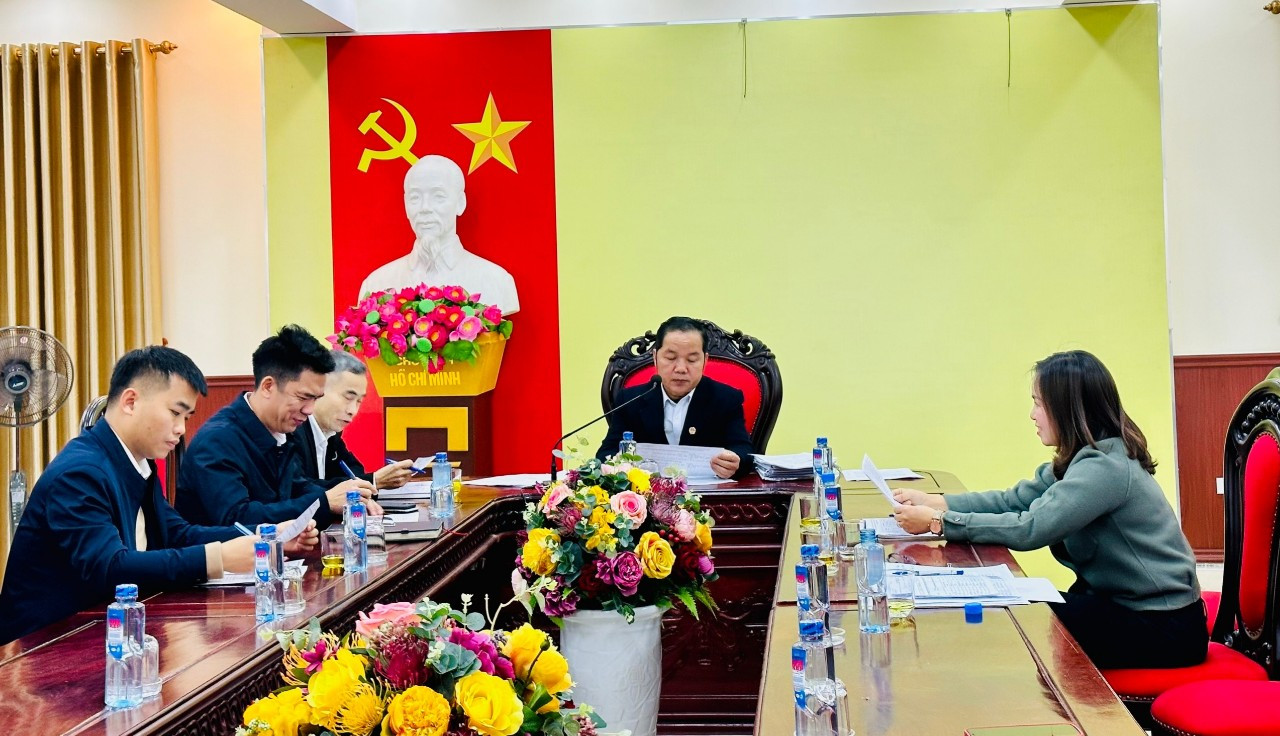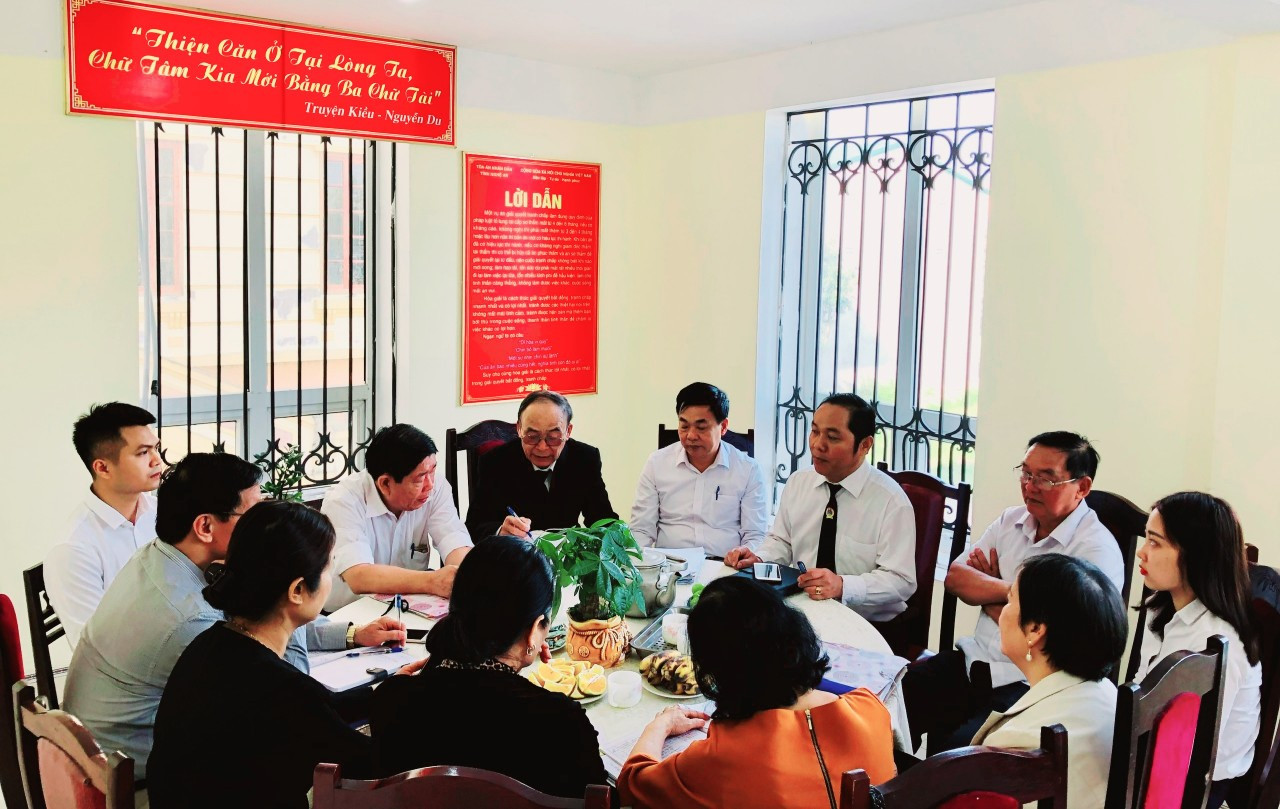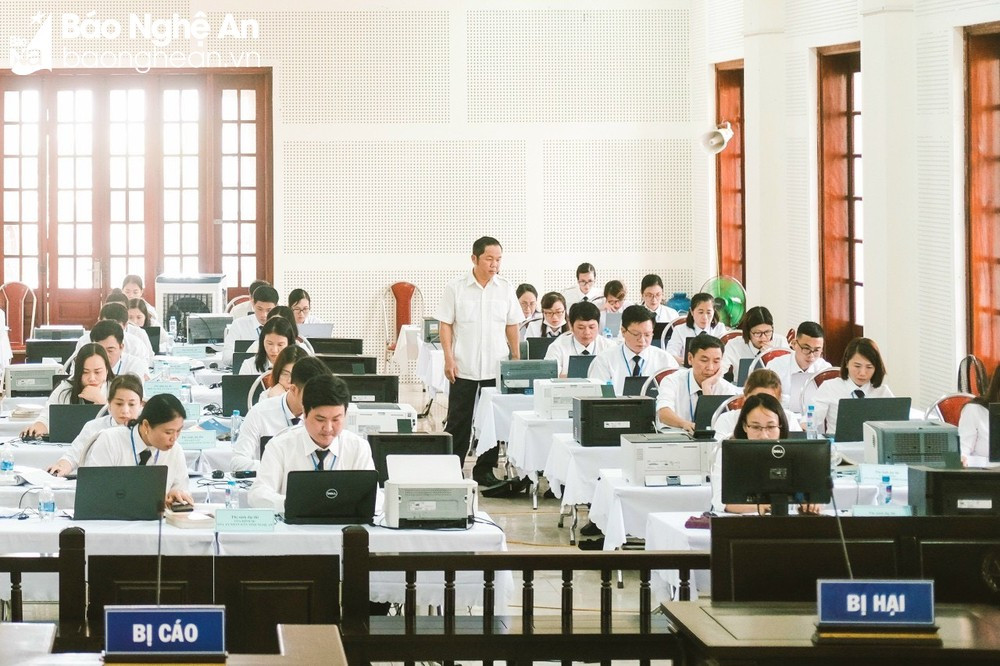The Chief Justice focuses on conciliation and dialogue to resolve conflicts.
(Baonghean.vn) - Helping parties resolve conflicts and disputes without having to open a trial, thereby saving costs, time, and effort of the parties and the State... is the method that Mr. Tran Ngoc Son, currently Chief Justice of Nghe An Provincial People's Court, has applied for decades.
Many conflicts are resolved
During his 28 years as a judge, Mr. Tran Ngoc Son has also participated in mediation and dialogue on civil disputes, family disputes, administrative disputes, etc., so he cannot remember how many cases he has participated in resolving.
However, according to Mr. Son, the key point in civil, family and administrative cases and complaints is the lack of understanding of the law or lack of sympathy between the parties, so strengthening mediation and dialogue is a form of direct mass mobilization to create consensus and self-resolution by the parties. This not only helps reduce pressure in resolving cases but also helps the parties maintain solidarity and ensure legitimate interests according to the law.
 |
Mr. Tran Ngoc Son during a citizen reception at the Provincial People's Court headquarters. Photo: Provincial People's Court |
Among the cases he has participated in resolving, Mr. Tran Ngoc Son clearly remembers the property ownership dispute between Mr. LVH and Mr. KVX in Que village, Binh Chuan commune, Con Cuong district. This case was previously brought to trial by the People's Court of Con Cuong district, but Mr. KVX later appealed. The cause of the dispute was that during the process of raising cattle, Mr. KVX lost a bull and later discovered that the bull had been captured by Mr. LVH. Mr. X came to ask for the bull back but Mr. H. refused. Therefore, Mr. X. submitted a petition to the People's Committee of Binh Chuan commune for resolution and the People's Committee assigned the bull to him to raise. However, Mr. H. later filed a lawsuit to return the bull.
After appealing to the appellate court, Mr. Tran Ngoc Son, then Deputy Chief Justice in charge of civil matters, who directly handled the case, returned to the area, met with both sides, and used the Thai language he had learned to analyze for the people. Mr. Son said: “Along with evoking the spirit of neighborliness, being Thai people with a tradition of solidarity, helping each other in times of need, we should not be tense because of a cow, losing the long-standing solidarity. At the same time, he explained that in addition to the identifying characteristics that both sides presented to confirm that the cow belonged to them, if they could not reach an agreement, they would be forced to conduct a genetic test. However, this is very expensive, sometimes the cost of the test is more than the value of the cow…”.
Although they were very tense before, when they heard the judge analyze the pros and cons, both sides calmed down. Understanding this psychology, Mr. Son continued to analyze and advise... so that in the end the parties understood. Mr. H. then voluntarily withdrew the entire content of the lawsuit, and Mr. X. withdrew the entire content of the appeal.
In addition to the above case, as a judge, Mr. Tran Ngoc Son also clearly remembers the property loan contract dispute between the plaintiff Mr. LCC and the defendant Mr. DXH, both residing in Dien Yen commune, Dien Chau district. This is a case that was previously brought to trial by the People's Court of Dien Chau district. In this case, the plaintiff Mr. LCC sued Mr. DXH for borrowing a total amount of 700 million VND, promising to pay in March 2018, but by the due date he only paid a small amount and asked Mr. H. to pay the remaining amount of nearly 600 million VND. The first instance judgment was appealed, and he was assigned to handle the appeal.
After learning about the specific conditions of both parties, he summoned the parties to reconcile and analyze. As for the defendant, Mr. DXH, he analyzed that when in difficulty, people lend him money without hesitation, which is a precious thing, now he has to pay... At the same time, knowing the relationship between the two families, he influenced his relatives to tell Mr. H. to pay the debt. According to Mr. Son, the happiest thing is that the two parties not only agreed on a debt repayment plan but also paid the money right in court.
“It is good to punish, but it is better not to punish.”
Always keeping in mind the spirit of President Ho Chi Minh who once advised the Court officials: "It is good to try correctly, but it is better not to try". Therefore, with civil and administrative cases, Mr. Tran Ngoc Son always aims at conciliation and dialogue to resolve conflicts among the people. Because in reality, if conflicts and disputes are not resolved promptly, they will turn from small conflicts into big conflicts, from purely civil disputes they can become criminal cases...
During his work, Mr. Tran Ngoc Son always spends time meeting people, listening to their requests and concerns. With specific cases, to successfully mediate and dialogue, according to Mr. Son, as soon as they receive a case, judges must carefully study the file on the basis of collecting information, clarifying the key issues of the case, determining the content of the requests and wishes of the parties in the case, and then proposing mediation options based on analyzing the psychology of the parties, with solutions that are both reasonable and emotional.
 |
Mr. Tran Ngoc Son chaired the meeting of the Mediation and Dialogue Department at the Court during the pilot period in 2019. Photo: Provincial People's Court |
For marital and family disputes, the judge must go to the locality where the parties live to collect documents and evidence to determine the cause, as well as the wishes of the wife, husband, and children related to the case; proactively find out the thoughts, wishes, needs, and even the concerns of the parties to find a solution. For disputes over inherited property, land use rights...
Before conducting mediation, the judge must work separately with each plaintiff or defendant to grasp the lawsuit requests. After choosing the time to conduct mediation, as an intermediary, the judge must clearly explain the legal provisions related to the settlement of the case, helping people better understand their rights and obligations, and on that basis, find an agreement that ensures harmony of the rights and interests of the parties.
As for administrative complaints, especially cases related to the field of granting, revoking, and canceling Land Use Rights Certificates... When handling them, first of all, judges must realize that the subjects of mass mobilization work are relatively different from civil, business, and commercial cases... because one side is the state administrative agency, and the other side is the people who always have the mentality of being the weak party in the case. Therefore, it is necessary to be patient and proactive in explaining to the plaintiff about the provisions of the law; the Party's policies and guidelines and local practices in accordance with the socio-economic development of the province. At the same time, there must be direct contact with the defendant in the case to arrange and schedule a suitable time for the dialogue session, avoiding postponements that prolong the time limit for resolving the case.
 |
Nghe An Provincial People's Court organized a competition to write judgments and court minutes. Photo: Provincial People's Court |
According to his experience, Mr. Tran Ngoc Son added that not only applying the law, this job also requires life experience, extensive knowledge of society, sophistication and sensitivity in handling problems, thereby helping the parties find the best solutions to resolve conflicts and disputes. Accordingly, as the head of the Provincial People's Court, in addition to paying attention to building a team of dedicated and politically steadfast staff, he also focuses on the need for court staff to be close to the people, understand the people, help the people and learn from the people. When faced with each case, the judges always ponder and research to find the most reasonable and sympathetic way to reconcile, minimizing the need for trial.
It is known that,Two-level People's Court of Nghe An province, every year the number of successful mediation cases always reaches a high rate. Particularly in implementing the Law on Mediation and Dialogue at Court, in 2021 and 2022, the number of cases transferred to mediation and dialogue was 5,800, of which 2,881 cases were successfully mediated and dialogued, accounting for 49.7%.


